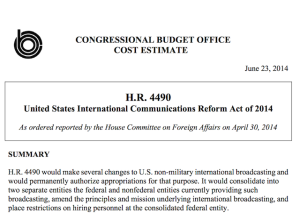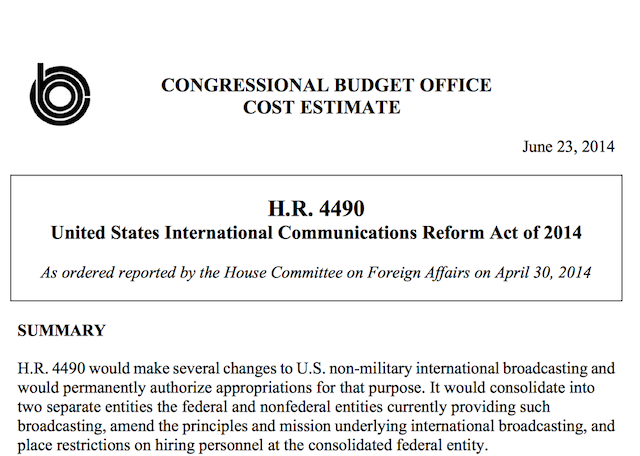BBG Watch Commentary
 A cost estimate of H.R. 4490, the United States International Communications Reform Act of 2014, prepared by the Congressional Budget Office (CBO), shows that its impact on the overall federal budget would not be significant.
A cost estimate of H.R. 4490, the United States International Communications Reform Act of 2014, prepared by the Congressional Budget Office (CBO), shows that its impact on the overall federal budget would not be significant.
“CBO estimates that implementing H.R. 4490 would require appropriations for U.S. non-military international broadcasting averaging $780 million annually over the 2015-2019 period. In comparison to the 2014 appropriated level of $725 million, those amounts include adjustments for expected inflation and savings generated primarily from the consolidation of private broadcasters.”
CONGRESSIONAL BUDGET OFFICE COST ESTIMATE
June 23, 2014
United States International Communications Reform Act of 2014
As ordered reported by the House Committee on Foreign Affairs on April 30, 2014
SUMMARY
H.R. 4490 would make several changes to U.S. non-military international broadcasting and would permanently authorize appropriations for that purpose. It would consolidate into two separate entities the federal and nonfederal entities currently providing such broadcasting, amend the principles and mission underlying international broadcasting, and place restrictions on hiring personnel at the consolidated federal entity.
CBO estimates that implementing H.R. 4490 would cost $3.7 billion over the 2015-2019 period, assuming appropriation of the necessary amounts. Pay-as-you-go procedures apply to this legislation because it would affect direct spending; however, CBO estimates that those effects would not be significant. Enacting the bill would not affect revenues.
H.R. 4490 contains no intergovernmental or private-sector mandates as defined in the Unfunded Mandates Reform Act (UMRA) and would not affect the budgets of state, local, or tribal governments.
ESTIMATED COST TO THE FEDERAL GOVERNMENT
The estimated budgetary impact of H.R. 4490 is shown in the following table. The costs of this legislation fall within budget function 150 (international affairs).
For this estimate, CBO assumes that H.R. 4490 will be enacted late in fiscal year 2014, that the necessary amounts will be appropriated each year, and that outlays will follow historical spending patterns for the affected programs.
Spending Subject to Appropriation
CBO estimates that implementing H.R. 4490 would require appropriations for U.S. non-military international broadcasting averaging $780 million annually over the 2015-2019 period. In comparison to the 2014 appropriated level of $725 million, those amounts include adjustments for expected inflation and savings generated primarily from the consolidation of private broadcasters. The bill also would remove the current requirement that all funds provided for such broadcasting must be authorized each fiscal year. The bill thus provides a permanent authorization to spend funds for those purposes. Assuming appropriation of the necessary amounts, CBO estimates that implementing the bill would cost $3.7 billion over the next five years.
H.R. 4490 would make several changes to the mission and structure of international broadcasting. Under current law, the Broadcasting Board of Governors (BBG) oversees federal and private entities (known as the “grantees”) that provide or support such broadcasting. The bill would abolish the BBG and consolidate the federal and private entities into two entities with separate management and boards. It also would amend the principles and mission underlying international broadcasting and restrict broadcasting to undemocratic countries and regions that lack free and widely accessible media. Finally, the bill would provide waiver authority in situations that are in the national security interest.
Federal Entities. The federal entities—the Voice of America (VOA), which includes the Office of Cuba Broadcasting (OCB), and the International Broadcasting Bureau—would be consolidated into the United States International Communications Agency (USICA). VOA’s public diplomacy mission would be restated to include supporting U.S. foreign policy objectives and providing news on the United States, its policies, and its people. The bill would not alter OCB’s mission or operations. Under the bill, USICA would make annual grants to the private entities in amounts similar to recent grants from existing entities. Finally, the bill would place restrictions on salaries and hiring personnel at USICA, but the agency could waive the restrictions on hiring after consulting with the Congress.
Based on information from the Administration, CBO expects that the new federal entity would consolidate operations in 2015 and have insignificant costs and savings related to that consolidation. The bill does not make specific changes to VOA’s programming, and CBO cannot determine how the changes to VOA’s mission under the bill would affect its programming costs. On one hand, VOA could cut certain services and programs that
overlap with broadcasting provided by other entities. On the other hand, VOA could revive its Arabic service to more comprehensively fulfill its mission under the bill (broadcasting in Arabic is currently provided by the Middle East Broadcasting Networks, which is a private entity). Finally, CBO estimates that the restrictions on salaries and hiring personnel would have insignificant savings each year.Grantees. The grantees—Radio Free Europe/Radio Liberty, Radio Free Asia, and Middle East Broadcasting Networks—would consolidate into the Freedom News Network (FNN). They would share a headquarters and management structure but retain their distinct programming and geographical presence. The FNN would continue the grantees’ current mission of providing uncensored local news and information to countries and regions that do not have an indigenous free media.
The grantees considered consolidating in 2012 and prepared an internal plan detailing the necessary steps as well as related costs and savings. That proposal contemplated consolidation within a year; however, H.R. 4490 would allow the grantees three years to fully consolidate. Based on information from the grantees, CBO expects that they would consolidate over the 2015-2017 period and that related costs and savings would be small and offsetting in 2015 and 2016. Starting in 2017, CBO estimates that consolidation would lead to savings of about $5 million each year as leases on unnecessary office space are not renewed and unneeded positions in management and technical support that fall open due to attrition remain unfilled.
Direct Spending
Section 133 would authorize USICA to retain the proceeds from sales of its facilities and equipment. Section 222 would allow FNN to accept funding from certain nonfederal sources to supplement annual grants from USICA. Based on information from the BBG and grantees, CBO estimates that any such amounts raised would be spent in the year they were collected and, thus, that enacting this provision would have insignificant effects on direct spending.
INTERGOVERNMENTAL AND PRIVATE-SECTOR IMPACT
H.R. 4490 contains no intergovernmental or private-sector mandates as defined in UMRA and would not affect the budgets of state, local, or tribal governments.
ESTIMATE PREPARED BY:
Federal Costs: Sunita D’Monte
Impact on State, Local, and Tribal Governments: J’nell L. Blanco Impact on the Private Sector: Marin BurnettESTIMATE APPROVED BY:
Theresa Gullo
Deputy Assistant Director for Budget Analysis

